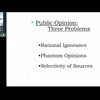partisk
Restricted completion of sparse partial Latin squares.
Combinatorics, Probability and Computing, 1-21. doi:10.1017/S096354831800055X, Cambridge University Press. Abstract An n × n partial Latin square P is called α-dense if each row and column has at most αnnon-emp times in . An × array where each cell contains a subset of {1,…, } is a (, ) -array if each symbol occurs at most times in each row and column and each cell contains a set of size at most . Combining the notions of completing partial Latin squares and avoiding arrays, we prove that there are constants , > 0 such that, for every positive integer , if is an -dense × partial Latin square, is an × -array, and no cell of contains a symbol that appears in the corresponding cell of , then there is a completion of that avoids ; that is, there is a Latin square that agrees with on every non-empty cell of , and, for each , satisfying 1 ≤ , ≤ , the symbol in position (, ) in does not appear in the corresponding cell of .

James Fishkin: Is Deliberation an Antidote to Extreme Partisan Polarization?
James Fishkin: Is Deliberation an Antidote to Extreme Partisan Polarization? Reflections on “America in One Room” This talk is positioned at the intersectionof two literatures: partisan polarizatio
Criminal organizing applying the theory of partial organization to four cases of organized crime.
Trends in Organized Crime, pp 1–28, doi:10.1007/s12117-017-9315-6. Abstract We explore how the idea of partial organization can provide insights in the study of organized crime. Studying criminal organi
Knowing the Game: Motivations and Skills Among Partisan Policy Professionals
"Knowing the Game: Motivations and Skills Among Partisan Policy Professionals", Journal of professions and organizations, Advance Access published September 21, 2016, doi: 10.1093/jpo/jow008 Abstract This
Radical right-wing parties in Europe: What populism got to do with it?
Journal of Language and Politics, Volume 16, Issue 4, pp. 485–496. Abstract In this paper I discuss, critically, the literature on populism and the extent to which it applies to the contemporary radical

Anna Lührmann: Walking the Talk. Which Parties Threaten Democracy?
The recent increase of democratic declines around the world has sparked a new generation of studies on the topic. Scholars agree that these days the main threat to democracy arises from democratically
Anna Lührmann: Walking the Talk. Which Parties Threaten Democracy?
AbstractThe recent increase of democratic declines around the world -- what Lührmann and Lindberg(2019) have dubbed "third wave of autocratization'' -- has sparked a new generation of studies on the t
James Fishkin: Is Deliberation an Antidote to Extreme Partisan Polarization? Reflections on “America in One Room”
AbstractIs Deliberation an Antidote to Extreme Partisan Polarization? Reflections on “America in One Room” Register here to join the seminar This talk is positioned at the intersectionof two literatures
Public broadcasting and democracy’s defense: responses to far-right parties in Germany and Sweden
Democratization, vol 30, issue 6 Abstract This article studies the response by public sphere institutions in democratic societies to far-right parties, focusing specifically on public broadcasting organ
Think-Tanks, Political Parties and Policy-Making in Post-Communist States: A Research Agenda
Professor Li Bennich-Björkman, Department of Political Science, Uppsala University Seminars host is Stefan Svallfors. The seminars are free of charge and take place at 13.00–14.30 in the Institute’s se








